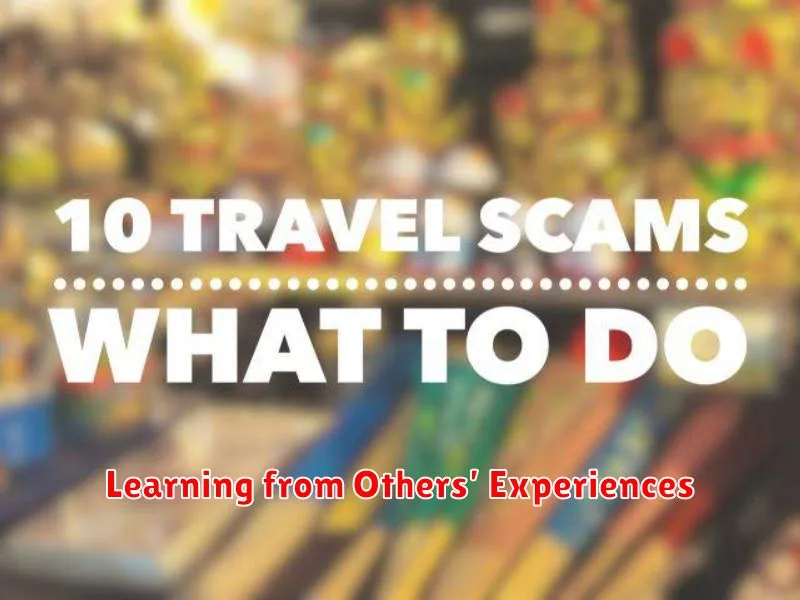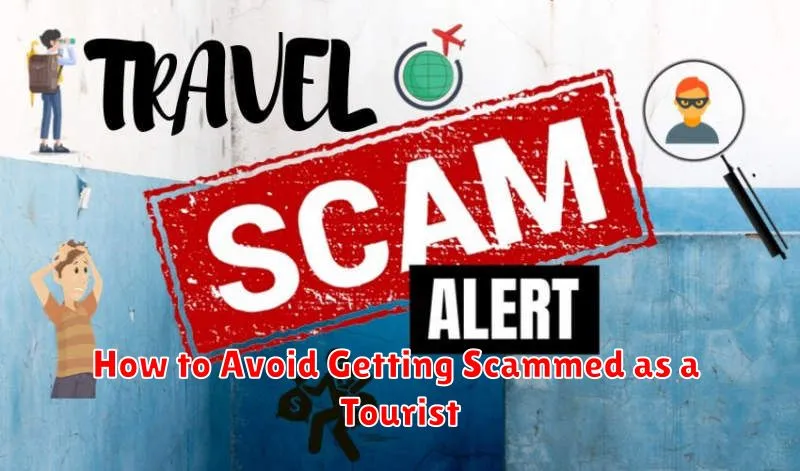Traveling to new and exciting destinations should be a joyful experience, not one marred by scams and fraud. Unfortunately, tourist scams are a reality in many parts of the world, targeting unsuspecting visitors. This article will provide essential tips and strategies on how to avoid getting scammed as a tourist, empowering you to protect yourself and your valuables while exploring new places. Learn how to identify common travel scams, safeguard your belongings, and navigate unfamiliar situations with confidence, ensuring your trip remains a positive and memorable one.
From pickpocketing and fake tour guides to credit card fraud and deceptive bargains, tourist scams can take various forms. Understanding the methods employed by scammers is the first step in preventing yourself from becoming a victim. This comprehensive guide will equip you with the knowledge and practical advice needed to recognize and avoid these scams, allowing you to enjoy your travel experience to the fullest. Learn how to be a savvy tourist and stay one step ahead of potential fraudsters, ensuring your trip is filled with adventure, not unpleasant surprises.
Recognizing Tourist-Focused Scams
Tourists are often targeted by scams due to their unfamiliarity with local customs and areas. Common tactics include distractions, such as someone bumping into you or staging a street performance, while an accomplice picks your pocket. Overly friendly individuals offering unsolicited help with directions or luggage should also be treated with caution, as they may be attempting to steer you towards overpriced services or shops, or attempting to steal your belongings. Be wary of offers that seem too good to be true, like extremely discounted goods or unbelievably favorable exchange rates. Research common scams in your destination beforehand to be better prepared.
Transportation-related scams are particularly prevalent. These can range from inflated taxi fares to rigged meters and “scenic” detours that significantly increase the cost of the ride. Always confirm the price beforehand or use reputable ride-hailing apps whenever possible. Be suspicious of unofficial taxis or drivers soliciting fares directly, especially at airports or train stations. Protecting yourself requires vigilance and awareness of your surroundings.
If you believe you have been targeted by a scam, remain calm and try to document the situation if possible. Note down details like descriptions of the individuals involved and any identifying information. Report the incident to local authorities, such as the police or tourist information centers. Contact your embassy or consulate if you need further assistance, particularly if passports or other important documents are involved. Remember to be proactive in protecting yourself and your valuables to minimize the risk of becoming a victim.
Avoiding Fake Taxi Drivers

Safety is paramount when using taxi services. To avoid fake taxi drivers, always opt for licensed taxis or reputable ride-hailing apps. Check for official identification, such as permits or licenses, displayed clearly in the vehicle. Verify the driver’s photo against any provided identification and ensure the vehicle matches the description provided by the dispatch or app. If anything feels amiss, don’t hesitate to decline the ride.
At the airport or train station, use designated taxi stands or pre-booked services. Avoid soliciting rides from individuals outside these areas. Before entering the vehicle, confirm the fare or ensure the meter is running. If using a ride-hailing app, double-check the driver and vehicle details match what’s displayed in the app. Share your trip details with a friend or family member whenever possible.
If you suspect a driver is illegitimate, do not enter the vehicle. Contact the authorities immediately and report the suspicious activity. Remember, your safety is the priority. It’s better to be cautious and take extra precautions than to risk your well-being.
Being Cautious at ATMs
Using an ATM can be a convenient way to access your money, but it’s crucial to prioritize your safety. Before approaching the machine, take a moment to observe your surroundings. Are there any suspicious individuals loitering nearby? If you feel uneasy, it’s best to find another ATM or return later. Once at the ATM, shield the keypad as you enter your PIN to prevent anyone from seeing it. Be mindful of individuals attempting to distract you or stand too close.
After completing your transaction, immediately secure your cash and card. Count your money discreetly once you’re in a safe location. Don’t leave your receipt behind at the machine; take it with you and shred it later. It’s also wise to regularly check your bank statements for any unauthorized transactions. If you notice anything suspicious, contact your bank immediately.
By taking these simple precautions, you can significantly reduce your risk of becoming a victim of ATM fraud or theft. Remember to remain vigilant and aware of your surroundings at all times.
Dealing with Street Vendors
Street vendors are a common sight in many cities, offering a variety of goods and services. Interacting with them requires courtesy and respect. Be mindful of local customs and regulations. If interested in a purchase, feel free to negotiate a price, but do so respectfully. If not interested, a polite “no thank you” is sufficient. Avoid aggressive bargaining or disrespectful behavior.
Sanitation and food safety can be a concern with street food vendors. Observe the vendor’s practices and the general cleanliness of their stall before making a purchase. If anything appears unsanitary, it’s best to move on. Be aware that consuming street food may carry some inherent risk, especially for those with sensitive stomachs.
In some areas, street vending may be unregulated or even illegal. Be aware of local laws and ordinances regarding street vendors. Avoid purchasing counterfeit or illegal goods. If you encounter any issues with a street vendor, such as harassment or aggressive sales tactics, consider reporting it to the appropriate local authorities.
What to Do if You’re Scammed
Discovering you’ve been scammed can be incredibly upsetting. It’s crucial to act quickly and methodically. First, document everything. This includes communication records (emails, text messages, letters), transaction details, and any other relevant information. Contact the method of payment you used (credit card company, bank, etc.) and report the fraudulent activity. They may be able to reverse the charges or offer other assistance. Finally, file a report with the appropriate authorities. This might be your local police department, the Federal Trade Commission (FTC), or the Internet Crime Complaint Center (IC3), depending on the nature of the scam.
Protecting yourself after a scam is also important. Change your passwords for any online accounts that may have been compromised, including email, banking, and social media. Monitor your financial accounts closely for any unauthorized activity. Be wary of any further communication from the scammer or anyone claiming to help you recover your losses. Unfortunately, recovery scams targeting victims of previous scams are common. Don’t hesitate to seek support from friends, family, or a counselor during this difficult time.
Reporting scams helps authorities track and identify these criminal activities, potentially preventing others from becoming victims. While recovering your losses may not always be possible, taking these steps can mitigate the damage and help you regain a sense of control.
Reporting to Local Authorities
Reporting incidents and concerns to local authorities is crucial for maintaining public safety and ensuring appropriate action is taken. It is the responsibility of individuals and organizations to report issues such as criminal activity, environmental hazards, and public health concerns. Timely reporting allows authorities to investigate, intervene, and resolve these matters effectively.
The specific procedures for reporting vary depending on the nature of the incident and the local authority involved. Generally, reports can be made through dedicated phone lines, online portals, or in-person visits to relevant agencies. When reporting, provide clear and concise information, including the date, time, and location of the incident, as well as any relevant details or evidence. Accurate and detailed reports help authorities to respond efficiently and appropriately.
It’s important to familiarize yourself with the contact information and reporting procedures for your local authorities. This knowledge enables you to quickly and effectively report incidents and concerns, contributing to a safer and more secure community. Remember, reporting is often the first step in addressing important issues and making a positive impact.
Learning from Others’ Experiences

Learning from the experiences of others is a powerful tool for personal and professional growth. By observing the successes and failures of those around us, or even figures from history, we can gain valuable insights and avoid potential pitfalls. Whether it’s hearing a colleague recount a challenging project or reading a biography of a historical figure, these narratives provide a wealth of knowledge that can inform our own decision-making. Paying attention to the choices others make and the consequences that follow allows us to develop a broader perspective and make more informed choices in our own lives.
This indirect learning, often referred to as vicarious learning, can be significantly more efficient than learning solely through personal experience. It allows us to expand our understanding without having to directly experience every challenge or setback. Reflecting on the experiences of others can help us identify patterns, recognize effective strategies, and understand the potential ramifications of different courses of action. This can be particularly valuable in navigating complex situations or when facing unfamiliar challenges.
To effectively learn from others, it’s crucial to be open-minded and receptive to different perspectives. Actively listen to stories and seek to understand the context and motivations behind the choices made. Consider both the positive and negative outcomes, and analyze how these lessons might apply to your own situation. By cultivating a habit of reflecting on the experiences of others, we can continuously expand our knowledge base and make more informed decisions, ultimately leading to greater success and personal fulfillment.

